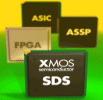 July 9, 2007 -- XMOS Semiconductor has revealed plans to introduce a completely new type of programmable semiconductor technology. The UK start-up's 'Software Defined Silicon' (SDS) will provide consumer electronics system designers with the unit cost advantage of SoCs and the flexibility of FPGAs.
July 9, 2007 -- XMOS Semiconductor has revealed plans to introduce a completely new type of programmable semiconductor technology. The UK start-up's 'Software Defined Silicon' (SDS) will provide consumer electronics system designers with the unit cost advantage of SoCs and the flexibility of FPGAs.
Based on arrays of processors, SDS devices will allow system functions that would normally be implemented in hardware to be defined in software, unifying the design flow for software and hardware. XMOS Semiconductor will be offering chips, software IP and development tools and its first product will be announced during Q1'2008.
James Foster, XMOS Semiconductor CEO said, "There's a technology gap waiting to be filled in consumer electronic system design. Designers need to more strongly differentiate their products and react more quickly to rapid changes in technology standards or fashion. Existing SoC and FPGA solutions simply don't offer the right combination of flexibility and cost."
David May, XMOS Semiconductor CTO continued, "What are the options today? An ASIC's NRE cost means it's too risky and expensive in all but the highest volumes. The rigidity of ASSP means design freedom is limited and real creativity is effectively strangled. Finally, FPGA's high complexity in programming and cost of silicon prohibits their use in high-volume consumer electronics."
XMOS Semiconductor's event driven, multi-threaded processor engine called XCore, has been developed to deliver fast real time response and low silicon cost. The integration of pin control within Xcore coupled with an inter-core communication link named XLink will allow complete systems, including interfaces, to be implemented in software. Product development uses a unified embedded software flow using C-based programming languages.
Headquartered in Bristol, UK, XMOS Semiconductor was founded in July 2005. The founders include David May, Professor of Computer Science at Bristol University and James Foster, the former CEO of Oxford Semiconductor. The company is backed by venture capital firms Amadeus Capital Partners and Esprit Capital Partners.
 July 9, 2007 -- XMOS Semiconductor has revealed plans to introduce a completely new type of programmable semiconductor technology. The UK start-up's 'Software Defined Silicon' (SDS) will provide consumer electronics system designers with the unit cost advantage of SoCs and the flexibility of FPGAs.
July 9, 2007 -- XMOS Semiconductor has revealed plans to introduce a completely new type of programmable semiconductor technology. The UK start-up's 'Software Defined Silicon' (SDS) will provide consumer electronics system designers with the unit cost advantage of SoCs and the flexibility of FPGAs.










